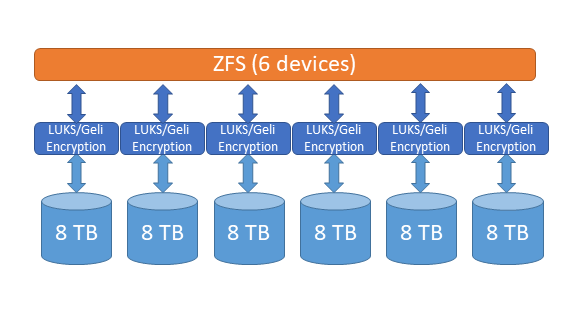Hello everyone,
I’ve been experimenting with LXD in my home server for about two months and I’m happy with it. Currently, my LXD host is Ubuntu 18.04 with everything installed in a single HDD (with LUKS encrypted). Now I’m thinking about serious hardware upgrade and probably gonna replace HDD by SSDs. Here is what i want to achieve:
1) Native ZFS format on a separate drive, just for LXD storage pool
I’m aware of benefits ZFS brings. Having a separate, small SSD just for OS install would grant me flexibility for future upgrade of OS/LXD. However I don’t know what is the best and safest way to do it. Would you use that separate drive just for the block device (when running lxd init)? Or would you mount this drive as entire /var/lib/lxd?
Here is what @brauner suggested :
mount --bind /dev/sdb /var/lib/lxd
But on the other hand, LXC 2.0 documentation says we shouldn’t do that:
ZFS doesn’t have to (and shouldn’t be) mounted on
/var/lib/lxd
So at this point i’m pretty clueless about what to do. In the scenario that I re-install OS or change the OS drive, I want to be able to easily get everything up and running again.
2) Redundancy with security
With 2 drives just for ZFS pool, I want to have mirrored vdevs in 1x2 configuration which is similar to RAID1 as lots of suggestion I found on internet. And it should be encrypted.
There are two methods I could think of: ZFS on LUKS and native encryption on ZFS. Native encryption sound great but from information I’ve red, it’s very new and unproven. Also, the lengthy and hacky process for that doesn’t look user-friendly at all. That guide also requires user to compile from source code because current Ubuntu zfsutils-linux package won’t support that feature until version 0.8.0.
So my question is what would you do for a production system?
On a side note, would self-encrypting drive be overall better than software encryption? In the OS drive, /boot partition is still unencrypted and vulnerable to evil maid attack. But I can move LUKS drives to another machine and recover my data, meanwhile SED would require support from motherboard (for ATA password) and proprietary software to achieve full disk encryption (in case of Samsung drives).
In conclusion, I’m looking for strategies/practices to build an LXD system which is secure, redundant and flexible in scenarios like moving ZFS pool to other host, reinstalling OS, expanding ZFS pool…
